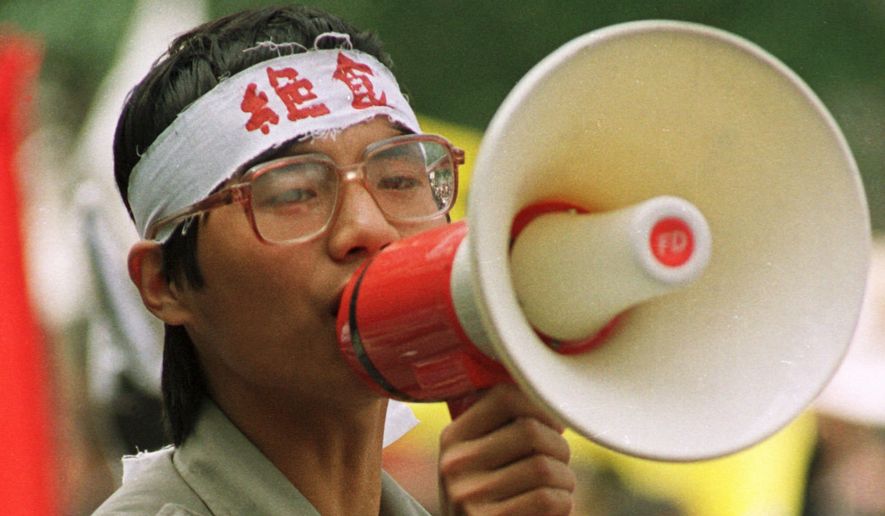As a young student, Wang Dan famously took a stand against China’s communist rulers in the chaos of Tiananmen Square. Three decades later, he is challenging a key outpost of the Beijing regime in the West.
In a campaign tied to the 30-year anniversary of the democracy rallies in central Beijing, Mr. Wang and a cohort of political activists are asking the Confucius Institute, the China-funded cultural outreach network with more than 100 locations in the U.S., to participate in a forum, “1989 pro-democracy movement and its suppression.”
The 49-year-old democracy activist does not expect the institute to accept the invitation.
“There’s two possibilities,” a stern-looking Mr. Wang said in an interview while sipping a Frappuccino at a downtown D.C. Starbucks. “One, they just ignore it. Another possibility is that maybe they will humbly reply, ’OK, we welcome you, but we already have a full schedule and cannot move space around for you.’ “
In addition to putting the spotlight on the lack of civil liberties in his homeland, Mr. Wang’s gambit is designed to play up what critics say are contradictions and controversies surrounding the Confucius Institute.
Congress has held hearings on the cultural work the institute says it is carrying out, noting its links to U.S. colleges such as George Washington University and the University of Maryland, and the teaching and educational materials supplied by the Communist Party-run government.
Some even suspect that the institute is an extension of Beijing’s intelligence service and is used as a way to keep tabs on Chinese students in the U.S. and other countries.
A top official of the U.S. network said the political criticisms are unfounded and that Mr. Wang’s proposed project does not fit with the Confucius Institute’s mission.
“Dr. Wang’s credential and topic are not related to Confucius Institute’s mission and curriculum on Chinese language. I’m afraid Dr. Wang might completely misunderstand what Confucius Institutes are,” Gao Qing, executive director of the Washington-based Confucius Institute U.S. Center, said in an email.
Mr. Wang, who recently joined fellow exiled dissidents to found the Washington-based Dialogue China, said the think tank and the offer to the Confucius Institute were meant to publicize dissenting perspectives on China that have trouble being heard in the U.S.
“One of the reasons I came back to the U.S. and started this think tank is that I wanted to bring back the voice of the dissident group because, of course, our view of China is relevant,” Mr. Wang said.
Unequal debate
With the rise of China as an economic superpower and strategic rival to the United States, Mr. Wang said, the debate over the nature of the Chinese government and its ultimate intentions has been dangerously lopsided.
“In my opinion, for the past 20 years there has been no balance on the opinion of China,” he said. “Now we all know that is wrong, so we want to do something right.”
The Confucius Institute is organized by a nonprofit group that its founders say aims to promote Chinese language study, cultural education and academic exchanges between China and the U.S. As of 2014, the Confucius Institute had over 400 branches around the globe.
Since its inception in 2004, the institute has been a magnet for controversy.
Sen. Marco Rubio, Florida Republican, and Sen. Tom Cotton, Arkansas Republican, have drafted legislation that would require the cultural institution to disclose all donations from foreign sources and to formally register as a foreign agent.
“Foreign agent” is an appropriate label for the Confucius Institute, Mr. Wang said.
“Of course, it is not only a so-called cultural institute. It is actually a foreign agent,” he said. “They have done a lot of things for the purposes of the Communist Party, and that is what they are doing now.”
He accused the institute of trying to influence young people to promote the ideology of the Communist Party and of stifling conversation on topics that the Chinese government deems sensitive.
“This is not an educational problem; it is a political problem. The whole American government and society needs to be more alert of these dangers,” he said.
Rep. Michael T. McCaul, Texas Republican, has urged his state’s public universities to cut ties with the program. He called it “a threat to our nation’s security by serving as a platform for China’s intelligence collection and political agenda.”
Mr. Wang, though, said that closing all U.S. branches of the Confucius Institute would be difficult as a practical matter.
“If we cannot close them, we must ask them to improve,” he said.
Mr. Wang was one of the most prominent student leaders of the Tiananmen Square protests. That role landed him on the government’s list of most-wanted counterrevolutionaries.
He spent four years in prison for his involvement in the protests. He was arrested again in 1995 on charges of plotting to overthrow the government and was sentenced to 11 years in prison.
He was released three years later and was allowed to seek medical treatment in the U.S.
Mr. Wang eventually earned a master’s degree and a Ph.D. at Harvard University while continuing to be an outspoken voice for democracy in his homeland.




Please read our comment policy before commenting.